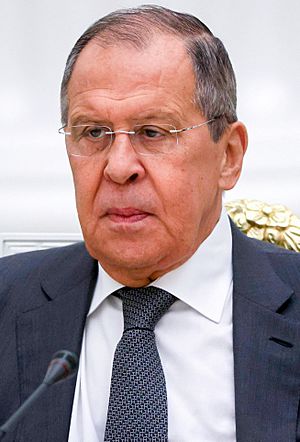Minister of Foreign Affairs (Russia) facts for kids
Quick facts for kids Minister of Foreign Affairsof the Russian Federation |
|
|---|---|
| Ministry of Foreign Affairs | |
| Style | Mr. Minister |
| Member of | Government, Security Council |
| Reports to | The President |
| Seat | Foreign Affairs Building, Moscow |
| Nominator | The President |
| Appointer | The President
(after consultation with the Federation Council)
|
| Term length | No fixed term |
| First holder | Andrei Kozyrev (post-Soviet era) |
The Minister of Foreign Affairs of the Russian Federation is a very important government official in Russia. This person is in charge of the Ministry of Foreign Affairs, which handles all of Russia's relationships with other countries. Think of them as Russia's main diplomat!
This minister is one of five special ministers who report directly to the President. The others are in charge of defense, internal affairs (like police), emergencies, and justice. Even though they are part of the Cabinet, their main boss is the President.
The President chooses the foreign minister after talking with the Federation Council, which is like one part of Russia's parliament. Other ministers are chosen by the Prime Minister and approved by another part of parliament, the State Duma. The foreign minister is also a permanent member of the Russian Security Council, which helps the President make big decisions about national safety.
Contents
Foreign Ministers Through History
The role of managing Russia's relationships with other countries has changed a lot over time. Here's a look at how this important job developed through different periods of Russian history.
Tsardom of Russia: Early Diplomacy
In the old Tsardom of Russia, the people in charge of foreign affairs were called "Heads of Ambassadorial Prikaz." A "Prikaz" was like a government department. These officials helped the Tsars, like Ivan the Terrible and Peter the Great, talk to other kingdoms and empires. They laid the groundwork for Russia's future international relations.
Some of the earliest known officials in this role include Ivan Viskovatyi and Andrey Vasilyev. Later, figures like Ivan Gramotin served multiple times during periods of change. These early diplomats were crucial in shaping Russia's place in the world.
| Portrait | Name | Term of office | Head of State | |
|---|---|---|---|---|
| Heads of Ambassadorial Prikaz | ||||
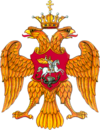 |
Ivan Viskovatyi | January 2, 1549 | August 2, 1562 | Ivan IV |
 |
Andrey Vasilyev | September, 1562 | July 25, 1570 | |
 |
Andrey Shchelkalov | November, 1570 | June 17, 1594 | |
| Feodor I | ||||
 |
Vasily Shchelkalov | June 30, 1594 | May 1601 | |
| Boris Godunov | ||||
 |
Afanasy Vlasyev | May 1601 | May 8, 1605 | |
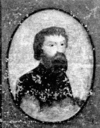 |
Ivan Gramotin | August 1605 | February 14, 1606 | False Dmitriy I |
 |
Vasily Telepnev | 1606 | March 1611 | Vasili IV |
| False Dmitry II | ||||
 |
Ivan Gramotin | November 20, 1611 | September 1612 | |
 |
Fyodor Androsov (Acting) |
September 1612 | June 1613 | |
 |
Pyotr Tretyakov | June 1613 | May 16, 1618 | Michael |
 |
Ivan Gramotin | May 1618 | December 21, 1626 | |
 |
Yefim Telepnyov | December 22, 1626 | July 30, 1630 | |
 |
Fyodor Likhachov | September 21, 1630 | December 25, 1631 | |
 |
Ivan Gryazev | October 1, 1632 | April 17, 1634 | |
 |
Ivan Gramotin | May 19, 1634 | July 19, 1635 | |
 |
Fyodor Likhachov | September 21, 1635 | September 1, 1643 | |
 |
Grigory Lvov | September 1, 1643 | December 27, 1646 | |
| Alexis | ||||
 |
Nazary Chistoy | January 6, 1647 | June 2, 1648 | |
 |
Mikhail Volosheninov | July 4, 1648 | April 1653 | |
 |
Almaz Ivanov | September 28, 1653 | March 10, 1667 | |
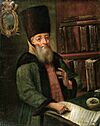 |
Afanasy Ordin-Nashchokin | July 15, 1667 | February 21, 1671 | |
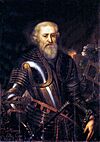 |
Artamon Matveyev | February 22, 1671 | July 3, 1676 | |
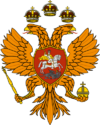 |
Larion Ivanov | July 4, 1676 | December 21, 1680 | Feodor III |
 |
Vasily Volynsky | December 21, 1680 | May 6, 1681 | |
 |
Larion Ivanov (Acting) |
May 6, 1681 | May 15, 1682 | |
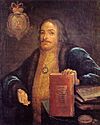 |
Vasily Golitsyn | May 17, 1682 | September 6, 1689 | Ivan V and Peter I (regency of Sofia Alekseyevna) |
 |
Emelian Ukraintsev | September 6, 1689 | April 19, 1699 | Ivan V and Peter I |
| Peter I | ||||
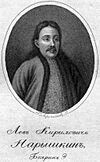 |
Lev Naryshkin | 1697 | 1699 | |
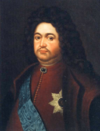 |
Fyodor Golovin | February 18, 1700 | August 2, 1706 | |
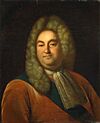 |
Pyotr Shafirov | September 1706 | 1708 | |
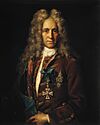 |
Gavriil Golovkin | 1708 | 15 December 1717 | |
Russian Empire: A New Era of Diplomacy
During the Russian Empire, the role of foreign affairs became more formal. The "Collegium of Foreign Affairs" was created, and its presidents were key figures in shaping Russia's relationships with other powerful nations. These leaders helped Russia become a major player on the world stage.
Later, the title changed to "Ministers of Foreign Affairs." These ministers worked closely with the Emperors and Empresses, like Catherine the Great and Alexander I, to manage treaties, alliances, and international conflicts.
| Portrait | Name | Term of office | Head of State | |
|---|---|---|---|---|
| Presidents of the Collegium of Foreign Affairs | ||||
 |
Gavriil Golovkin | 15 December 1717 | January 20, 1734 | Peter I |
| Catherine I | ||||
| Peter II | ||||
| Anna | ||||
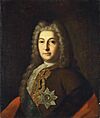 |
Andrey Osterman | 1734 | 1740 | |
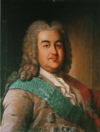 |
Aleksey Tcherkassky | November 10, 1740 | November 4, 1742 | Ivan VI |
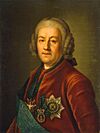 |
Alexey Bestuzhev-Ryumin | November 4, 1742 | February 15, 1758 | Elizabeth |
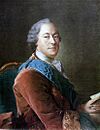 |
Mikhail Vorontsov | November 23, 1758 | October 27, 1763 | |
| Peter III | ||||
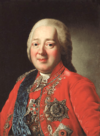 |
Nikita Panin | October 27, 1763 | April 10, 1781 | Catherine II |
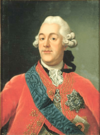 |
Ivan Osterman | April 10, 1781 | May 2, 1797 | |
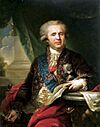 |
Aleksandr Bezborodko | May 2, 1797 | April 6, 1799 | Paul I |
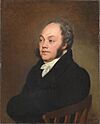 |
Fyodor Rostopchin | April 6, 1799 | February 20, 1801 | |
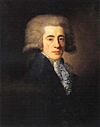 |
Nikita Panin | March 23, 1801 | September 30, 1801 | Alexander I |
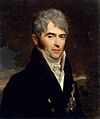 |
Viktor Kochubey | September 30, 1801 | September 8, 1802 | |
| Ministers of Foreign Affairs | ||||
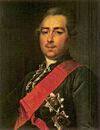 |
Alexander Vorontsov | September 8, 1802 | January 16, 1804 | Alexander I |
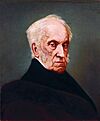 |
Adam Jerzy Czartoryski | January 16, 1804 | June 17, 1806 | |
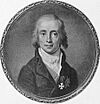 |
Andreas Eberhard von Budberg | June 17, 1806 | August 30, 1807 | |
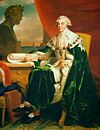 |
Nikolay Rumyantsev | February 12, 1808 | August 1, 1814 | |
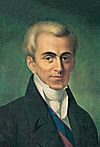 |
Ioannis Kapodistrias (Joint with Karl Nesselrode) |
January 31, 1816 | August 19, 1822 | |
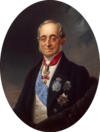 |
Karl Nesselrode | 1814 | April 15, 1856 | |
| Nicholas I | ||||
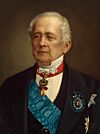 |
Alexander Gorchakov | April 15, 1856 | 9 April 1882 | Alexander II |
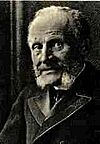 |
Nicholas de Giers | April 9, 1882 | January 26, 1895 | Alexander III |
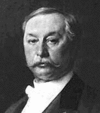 |
Alexei Lobanov-Rostovsky | March 18, 1895 | August 30, 1896 | Nicholas II |
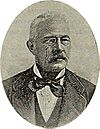 |
Nikolay Shishkin | September 1, 1896 | January 13, 1897 | |
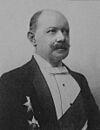 |
Mikhail Muravyov | January 13, 1897 | June 21, 1900 | |
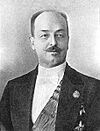 |
Vladimir Lambsdorff | January 6, 1901 | May 11, 1906 | |
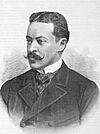 |
Alexander Izvolsky | May 11, 1906 | October 11, 1910 | |
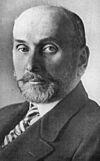 |
Sergey Sazonov | October 11, 1910 | July 20, 1916 | |
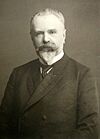 |
Boris Stürmer | July 20, 1916 | November 23, 1916 | |
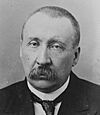 |
Nikolay Pokrovsky | November 23, 1916 | March 2, 1917 | |
Provisional Government: A Brief Period
After the fall of the Russian Empire, a Provisional Government took charge for a short time. During this period, new foreign ministers were appointed to handle Russia's international relations during a very uncertain time.
| Minister | Party | Term of Office | Prime Minister | ||||
|---|---|---|---|---|---|---|---|
| Ministers of Foreign Affairs | |||||||
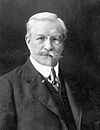 |
Pavel Milyukov | Constitutional Democratic Party | March 2, 1917 | May 1, 1917 | George Lvov | ||
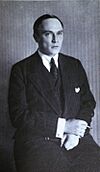 |
Mikhail Tereshchenko | Independent | May 5, 1917 | November 7, 1917 | |||
| Alexander Kerensky | |||||||
Russian SFSR: Soviet Era Diplomacy
During the Soviet era, Russia was known as the Russian Soviet Federative Socialist Republic (RSFSR). The foreign affairs leaders were called "People's Commissars of Foreign Affairs" and later "Ministers of Foreign Affairs." They played a big role in shaping the Soviet Union's foreign policy.
Notable figures like Leon Trotsky and Georgy Chicherin held this position in the early days. For a long period, the main foreign policy decisions were handled by the central Soviet Union government. The RSFSR's own foreign ministry was re-established later.
| Minister | Party | Term of Office | Head of State | ||||
|---|---|---|---|---|---|---|---|
| People's Commissars of Foreign Affairs | |||||||
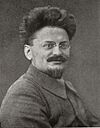 |
Leon Trotsky | Social Democratic Labour Party (Bolshevik) |
November 7, 1917 | March 13, 1918 | Lev Kamenev | ||
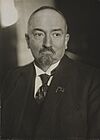 |
Georgy Chicherin | Communist Party | April 9, 1918 | July 6, 1923 | |||
| Post abolished (1923–1944). Power transferred to Ministry of Foreign Affairs of the Soviet Union. | |||||||
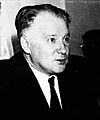 |
Anatoly Lavrentiev | Communist Party | March 8, 1944 | March 13, 1946 | Nikolay Shvernik | ||
| Post abolished | |||||||
| Ministers of Foreign Affairs | |||||||
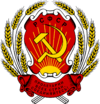 |
Mikhail Yakovlev | Communist Party | April 16, 1959 | August 5, 1960 | Nikolai Ignatov | ||
| Nikolay Organov | |||||||
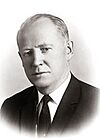 |
Sergey Lapin | Communist Party | September 5, 1960 | January 20, 1962 | |||
 |
Mikhail Menshikov | February 1, 1962 | September 11, 1968 | ||||
| Nikolai Ignatov | |||||||
| Mikhail Yasnov | |||||||
 |
Aleksei A. Rodionov | Communist Party | September 11, 1968 | May 7, 1971 | |||
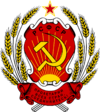 |
Fyodor Titov | Communist Party | May 7, 1971 | May 28, 1982 | |||
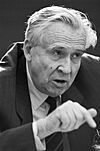 |
Vladimir Vinogradov | Communist Party | May 28, 1982 | June 15, 1990 | |||
| Vladimir Orlov | |||||||
| Vitaly Vorotnikov | |||||||
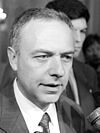 |
Andrey Kozyrev | Independent | October 11, 1990 | December 26, 1991 | Boris Yeltsin | ||
Russian Federation: Modern Diplomacy
Since 1991, Russia has been known as the Russian Federation. The Minister of Foreign Affairs continues to be a very important role. These ministers work to build relationships, solve problems, and represent Russia's interests around the world.
Andrey Kozyrev was the first foreign minister of the new Russian Federation. Later, Yevgeny Primakov and Igor Ivanov held the position. Since 2004, Sergey Lavrov has been the Minister of Foreign Affairs, making him one of the longest-serving foreign ministers in recent Russian history.
| Minister | Term of Office | Party | Cabinet | President | ||||
|---|---|---|---|---|---|---|---|---|
| Ministers of Foreign Affairs | ||||||||
 |
Andrey Kozyrev | December 27, 1991 | January 5, 1996 | Independent | Yeltsin–Gaidar | Boris Yeltsin | ||
| Chernomyrdin I | ||||||||
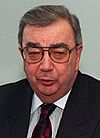 |
Yevgeny Primakov | January 9, 1996 | September 11, 1998 | Independent | ||||
| Chernomyrdin II | ||||||||
| Kiriyenko | ||||||||
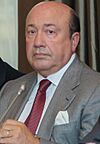 |
Igor Ivanov | September 30, 1998 | February 24, 2004 | Independent | Primakov | |||
| Stepashin | ||||||||
| Putin I | ||||||||
| Kasyanov | Vladimir Putin | |||||||
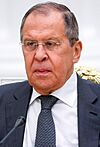 |
Sergey Lavrov | February 24, 2004 | Incumbent | United Russia | Fradkov I | |||
| Fradkov II | ||||||||
| Zubkov | ||||||||
| Putin II | Dmitry Medvedev | |||||||
| Medvedev I | Vladimir Putin | |||||||
| Medvedev II | ||||||||
| Mishustin I | ||||||||
| Mishustin II | ||||||||
Timeline
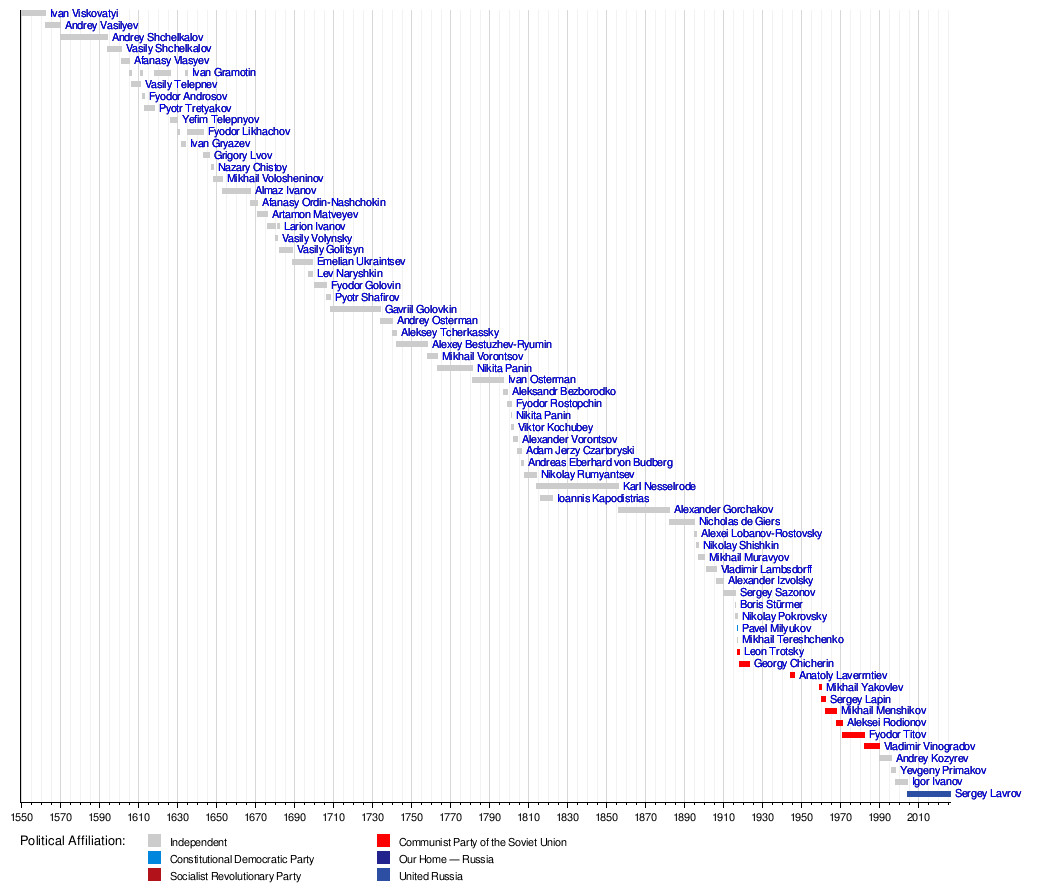
See also
- Ministry of Foreign Affairs (Russia)
- List of Soviet foreign ministers
- Ministry of Foreign Affairs (Soviet Union)
 | William Lucy |
 | Charles Hayes |
 | Cleveland Robinson |


